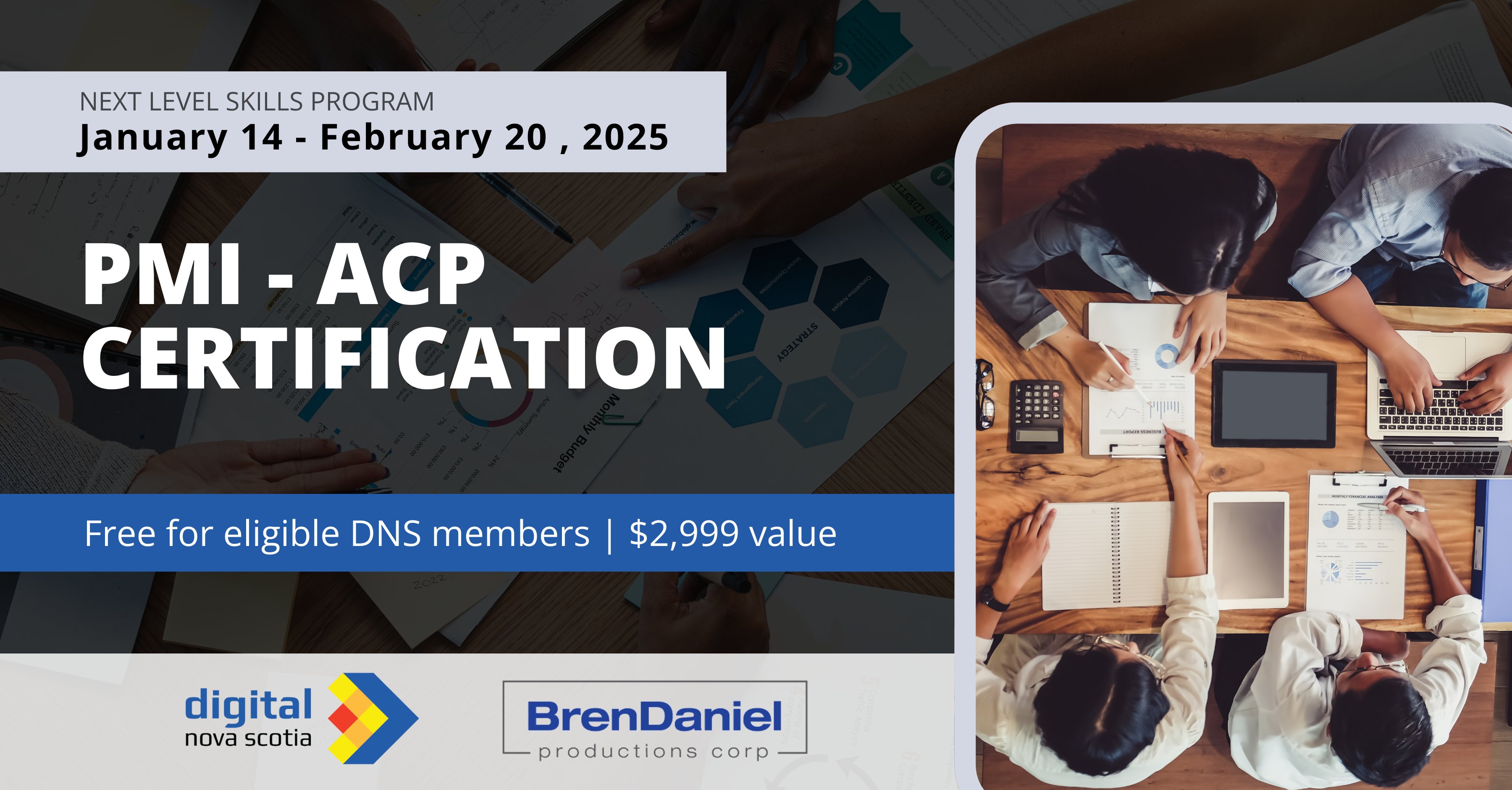
January 14 – February 20, 2025
Valued at $2,999 +HST, FREE for eligible DNS members
Hosted by Brenda Fay, BrenDaniel Productions
This program is directed to prepare participants for PMI’s Agile Certified Practitioner (ACP) exam. Along the way, participants discuss and review aspects of Agile delivery extensively. With this knowledge, individuals are better able to work with Agile projects and product delivery for their organizations. This program includes 24 hours total of training which includes twelve 2-hour online classes. Participants have email access to the facilitator during and after the program, so they may discuss any Agile topics in preparation for the exam. Participants are required to attend at least 90% of the total 24 hours to get credit for the educational hours as required by PMI for the certification.
The program includes all materials, training and support required to pass the PMI-ACP exam. When a participant completes the training, one year of PMI membership will be paid. When the participant successfully submits their PMI-ACP application to PMI, their PMI-ACP exam fees will be paid. The PMI-ACP exam application is required to be submitted within three months of the program end date.
Who should take this course?
This course is intended for professionals who want to gain the PMI-ACP certification. PMI has designated requirements which individuals must meet to qualify to write the PMI-ACP exam.
- You must have:
- A high school diploma,
- 21 contact hours of training in Agile practices (which this program provides),
- 12 months of general project experience within the last 5 years. If you currently have your PMP® or PgMP®, this requirement is covered, and
- 8 months of Agile project experience within the last 3 years. (Have a look at projects that have been run in an iterative and incremental manner.)
Course Outline
In this first session of the program, we discuss,
- Why Agile?
- The value and purpose of this Agile certification
- What being Agile means
- An overview of Agile frameworks: Scrum and more
- The requirements for the Agile certification
- The materials for the course and a study plan
Agile Principles and Mindset
- Agile terms
- PMI’s Agile Domains
- The history of the Agile Manifesto
- The Values and Principles of the Agile Manifesto
- Why the Mindset is so important
- Agile Leadership
Value-driven Delivery
- Defining value-driven delivery
- Evaluating value: metrics, KPI’s, risk and more
- Prioritizing value
- Incremental delivery: Minimal Viable Product, Kanban boards, WIP
- Contracting: DSDM, Fixed Price, Customized
- Verifying and Validating value
Stakeholder Engagement
- Principles of Stakeholder Engagement
- A Shared Vision: Chartering, Definition of Done, Wireframes, Personas
- How to Communicate with Stakeholders
- Collaboration
- Interpersonal Skills
Team Performance
- Agile Teams: Team roles, generalizing specialists, models, high-performing teams
- Building collaborative team spaces
- Tracking team performance: burn charts, velocity
Adaptive Planning 1
- What makes Agile planning different?
- Principles of Agile planning
- Value-based analysis and decomposition
- Time in planning: Timeboxing, Estimate ranges and Ideal Time
- Sizing and Estimating: Requirements, User Stories, Backlogs, Methods, Product Roadmap
Adaptive Planning 2
- Visioning
- Release Planning
- Iteration Planning
- Spikes
- Daily Stand-Ups
- Review of Course Topics to-date
Problem Detection and Resolution
- How Problems affect Projects: Cost of Change, Technical Debt
- Agile Transformations: Failure Modes and Success Modes
- Detecting Problems: Lead Time, Cycle Time, Defects, Variance, Analysis, Trend Analysis, Control Limits
- Risk – Threats and Issues: Risk-adjusted Backlog, Risk Severity, Risk Burndown Graphs
- Problem Solving
Continuous Improvement (Process, Product, People)
- Kaizen and Continuous Improvement
- Process: Tailoring, Analysis, Systems Thinking, Value Stream Mapping, Pre-Mortems
- Product: Reviews, Feedback Loops and Methods, Learning Cycles, Approved Iterations
- People: Retrospectives, Team Self-Assessments
- PMI’s Code of Ethics and Professional Conduct
Review and Wrap-up
- Review of selected and requested topics
- Review of Exam Application Status

